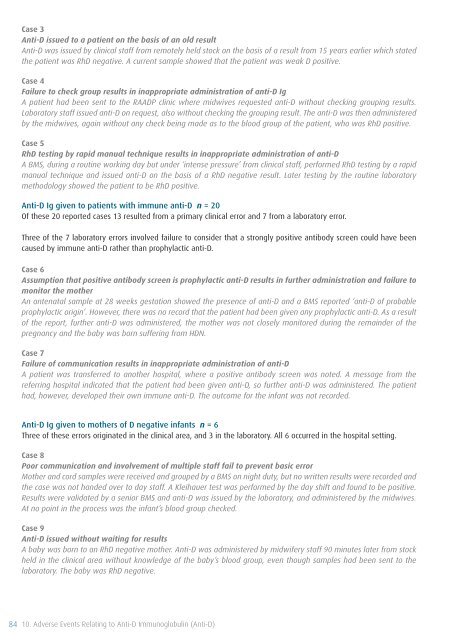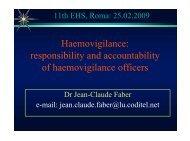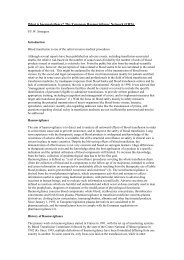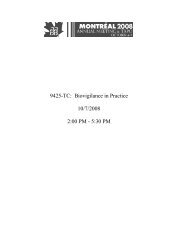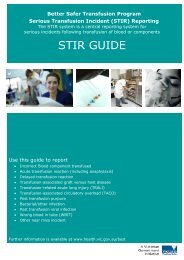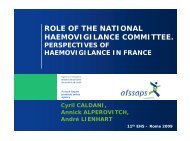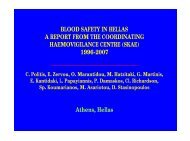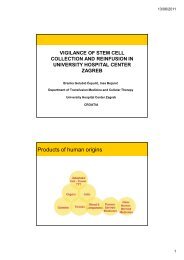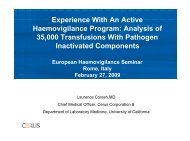SHOT Annual Report 2009 - Serious Hazards of Transfusion
SHOT Annual Report 2009 - Serious Hazards of Transfusion
SHOT Annual Report 2009 - Serious Hazards of Transfusion
You also want an ePaper? Increase the reach of your titles
YUMPU automatically turns print PDFs into web optimized ePapers that Google loves.
Case 3<br />
Anti-D issued to a patient on the basis <strong>of</strong> an old result<br />
Anti-D was issued by clinical staff from remotely held stock on the basis <strong>of</strong> a result from 15 years earlier which stated<br />
the patient was RhD negative. A current sample showed that the patient was weak D positive.<br />
Case 4<br />
Failure to check group results in inappropriate administration <strong>of</strong> anti-D Ig<br />
A patient had been sent to the RAADP clinic where midwives requested anti-D without checking grouping results.<br />
Laboratory staff issued anti-D on request, also without checking the grouping result. The anti-D was then administered<br />
by the midwives, again without any check being made as to the blood group <strong>of</strong> the patient, who was RhD positive.<br />
Case 5<br />
RhD testing by rapid manual technique results in inappropriate administration <strong>of</strong> anti-D<br />
A BMS, during a routine working day but under ‘intense pressure’ from clinical staff, performed RhD testing by a rapid<br />
manual technique and issued anti-D on the basis <strong>of</strong> a RhD negative result. Later testing by the routine laboratory<br />
methodology showed the patient to be RhD positive.<br />
Anti-D Ig given to patients with immune anti-D n = 20<br />
Of these 20 reported cases 13 resulted from a primary clinical error and 7 from a laboratory error.<br />
Three <strong>of</strong> the 7 laboratory errors involved failure to consider that a strongly positive antibody screen could have been<br />
caused by immune anti-D rather than prophylactic anti-D.<br />
Case 6<br />
Assumption that positive antibody screen is prophylactic anti-D results in further administration and failure to<br />
monitor the mother<br />
An antenatal sample at 28 weeks gestation showed the presence <strong>of</strong> anti-D and a BMS reported ‘anti-D <strong>of</strong> probable<br />
prophylactic origin’. However, there was no record that the patient had been given any prophylactic anti-D. As a result<br />
<strong>of</strong> the report, further anti-D was administered, the mother was not closely monitored during the remainder <strong>of</strong> the<br />
pregnancy and the baby was born suffering from HDN.<br />
Case 7<br />
Failure <strong>of</strong> communication results in inappropriate administration <strong>of</strong> anti-D<br />
A patient was transferred to another hospital, where a positive antibody screen was noted. A message from the<br />
referring hospital indicated that the patient had been given anti-D, so further anti-D was administered. The patient<br />
had, however, developed their own immune anti-D. The outcome for the infant was not recorded.<br />
Anti-D Ig given to mothers <strong>of</strong> D negative infants n = 6<br />
Three <strong>of</strong> these errors originated in the clinical area, and 3 in the laboratory. All 6 occurred in the hospital setting.<br />
Case 8<br />
Poor communication and involvement <strong>of</strong> multiple staff fail to prevent basic error<br />
Mother and cord samples were received and grouped by a BMS on night duty, but no written results were recorded and<br />
the case was not handed over to day staff. A Kleihauer test was performed by the day shift and found to be positive.<br />
Results were validated by a senior BMS and anti-D was issued by the laboratory, and administered by the midwives.<br />
At no point in the process was the infant’s blood group checked.<br />
Case 9<br />
Anti-D issued without waiting for results<br />
A baby was born to an RhD negative mother. Anti-D was administered by midwifery staff 90 minutes later from stock<br />
held in the clinical area without knowledge <strong>of</strong> the baby’s blood group, even though samples had been sent to the<br />
laboratory. The baby was RhD negative.<br />
84 10. Adverse Events Relating to Anti-D Immunoglobulin (Anti-D)


